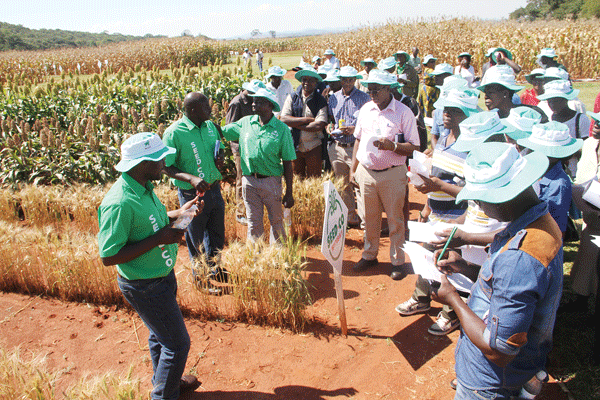
What is really going on when someone is having a field day? The dictionary describes it as “taking advantage of an opportunity to do something you enjoy”.
gardening with Doreen Badze

Children may have field days when parents are not home, usually having freedom of doing what they normally wouldn’t do. “Field Day” was a commonly used term in the military where it originated around the 18th century — it extended to refer to any event that would have happened in the field. Since then, the phrase has revolved to include opportunity, as well as enjoyment. During my time as a child, visiting the Snake Park as a school was referred to as a school trip and now some refer to similar visits as field days.
I will share one of my unusual field days when I was in nursing school. While excited about the announcement of a field day, it was followed by a warning that if any of us could not stand visualising extreme graphics, it was better to stay behind. It was a much-needed break from the classroom even though it was visiting the coroner’s office, so I still opted to go. On arrival, sure enough an autopsy of a drowned 12-year-old girl was in progress by a female doctor. There was cutting equipment similar to what I had seen in a butchery before. It was business as usual for the staff, a lady assisting the doctor to weigh body organs and ribs being cut open with what seemed like garden shears. We were welcomed and shown around. In the other side of the room a body had just arrived — a 32-year-old man who had committed suicide and was awaiting his turn for an autopsy. As the doctor’s explanations were going on, I remember concentrating on how to keep myself from fainting. Yes, it was one field day I will never forget, but it was also in alignment with the realities of the career I had chosen then.
Agricultural field days
Fast forward, last week I attended a popular field day organised by Charter Seeds. It was my second time to attend it and I must admit it was well-organised and rejuvenating. According to their agronomist, the purpose of their field days, which were held in Bulawayo and Harare, was basically to track trials of Stark Ayres seed varieties under different conditions. Trials allow them to discard and promote certain varieties while bringing new ones into production. The Harare field day was attended by Agriculture deputy minister as well as Reserve Bank of Zimbabwe representatives who gave information on banks financing horticultural activities. Export experts from the central bank were introduced as advisers of aspiring horticultural farmers who wanted to export their produce.
Generally, there was showcasing and teaching of farmers about variety performances and good genetics.
In a farming group I belong to that comprises over 200 farmers, we had a discussion about what agricultural field days mean to us. One farmer who attended the Charter Seeds field day said; “This field day topic you brought up is so important to all in the agricultural industry. I noted the comments farmers made about limited time per station at the recent annual field day. They came back home with many unanswered questions. Field days should be initiated by farmers; that way they [farmers] determine the theme and programme of the day in order to benefit fully from them. Some farmers that lack organisation among themselves give opportunity to other stakeholders to take leading roles and decide the scope of the field days. Farmers end up being like passengers and may not learn or share experiences as much as they would expect because the organisers would have their own programme that reduces the input expected from farmers.”
- Chamisa under fire over US$120K donation
- Mavhunga puts DeMbare into Chibuku quarterfinals
- Pension funds bet on Cabora Bassa oilfields
- Councils defy govt fire tender directive
Keep Reading
Another farmer weighed in and said, “When you attend a field day organised by a seed house or agrochemical company, you should expect one thing, which is marketing because they are in business to make money.”
A lot was said and I came to a conclusion that while all field days are embraced, there is no one field day that can meet all of farmers’ requirements. However, farmers can learn a lot from other successful farmers in their specialities, for example the sweet potato farmer can hold a field day that will benefit the knowledgeable tomato grower who in turn can reciprocate. Additionally, many other entities like agrochemical dealers are needed on field days to enhance what we do, which is farming. Our goals as farmers can be met by different field days while organisers of field days meet their goals too.
Serious active farmers can request to join our farming group via WhatsApp using the number below.
Happy gardening week!!
Doreen Mutobaya Badze is a retired nurse and passion-driven gardener. She can be reached on Cell: 0779 730 880 or on 16 Metcalf Road, Greendale, Harare. Email: [email protected] Facebook Page: Badze Garden Nursery











